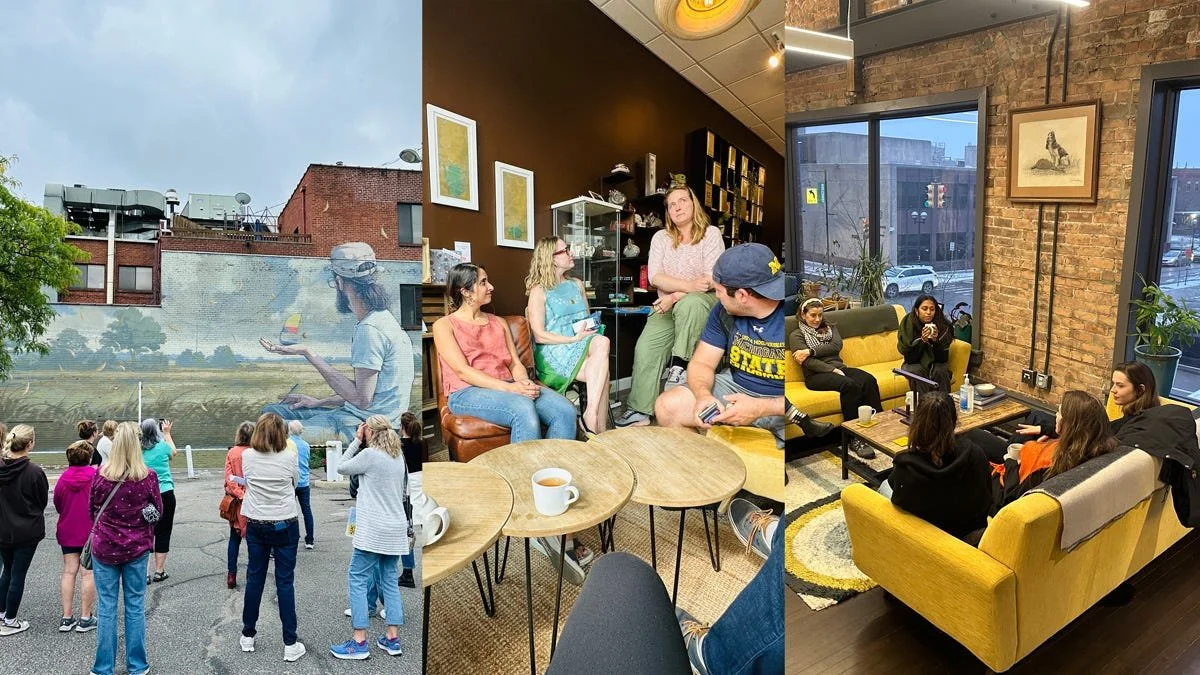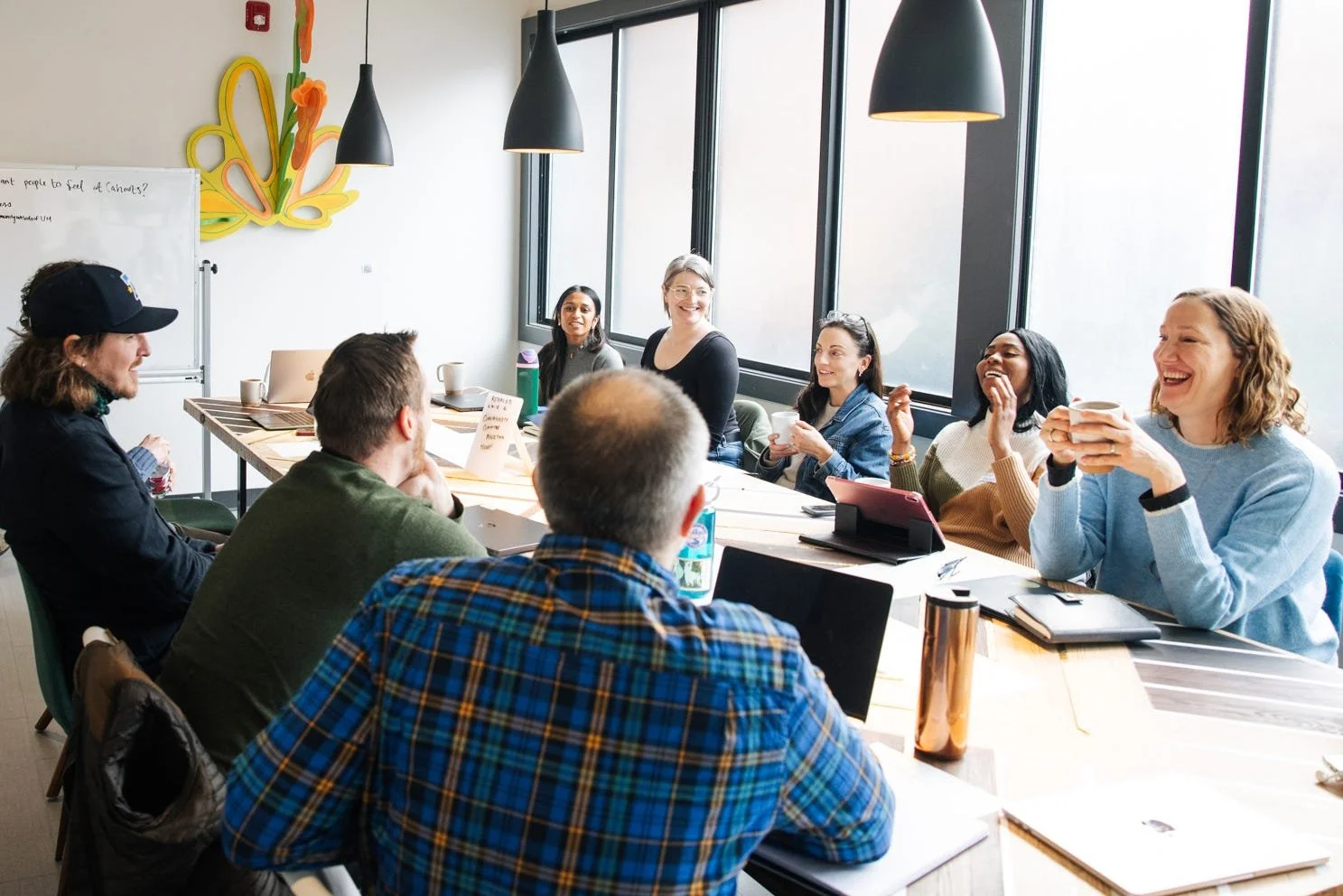The Case For An Inconvenient Life
Have our modern day conveniences stripped us of connection?
“Would your kids like some lollipops?”
It was a seemingly innocuous question, posed by the bank teller at the drive-through as she glanced back at myself and my other siblings in the back of the van.
My ten year old face lit up with hope. Why yes, yes - we would love some lollipops.
My dad’s face lit up as well.
“You know, actually…” he began.
Oh no.
I shrank down behind the van bench in front of me. “Just say no,” I pleaded in my head.
It was too late.
My father dove into a monologue on how our family had stopped getting colds after we eliminated processed sugar from our diets. As he droned on, the teller’s eyes rolled back in her head almost as far as the drive-through line creeping out onto the main road behind us.
Every few weeks, a new article comes out on the current loneliness epidemic. Growing up, my parents had never heard of such a thing. I wished my parents were lonely.
Heading out the door to run errands with my parents, I had to resist the urge to wrap some overnight provisions in a little handkerchief and tie it to the end of a stick. It didn’t matter if they were running into a friend or conversing with a stranger, the chatting would drag on for what seemed like a century. When they finished the final knee-slapping “welp” of their midwest goodbye, I would rise shakily from my seat on the floor, brushing imaginary grey hairs from my face as my creaking bones struggled to find my feet.
These days, I deposit checks on my mobile app, my childhood woes alleviated by our modern day conveniences. But the other day, I went to the bank in person to open a new account. The teller peered at me down the hollows of the hallway, startled to see a live human. As we started talking, I learned he struggled to find a job in his desired field after the pandemic messed with his internship plans, so he gave up on pursuing that path. I found myself biting my tongue resisting the urge to launch into a little good old fatherly advice, and we chatted it up a bit as he talked through his frustrations.
As I walked away from the conversation, I felt a little hit of endorphins from the exchange with a human instead of a machine. And I couldn’t help but wonder if all these inconveniences we’ve eliminated were actually connections.
I used to pride myself in being independent, which is ironic because we are more reliant on other people than ever before. Everything I am using, from the walls around me to the computer I’m typing on, required thousands of people’s contributions. The hunter-gatherers relied on the 30 people in their band. Today I rely on the village of Amazon and Apple, fueled by millions of people. Yet the digital divide of our modern day conveniences has separated us from the flesh and blood that enables our lives, creating the illusion of independence.
We don’t have to talk to people anymore. Instead, we can have food delivered off our phone and then sit and watch shows of people making food. In the past, bumping into a person in the wild was a way to meet a potential partner. Now, we can use a dating app to order a person like a pizza, and then sit on the couch together and watch a tv show about people dating.
And while at first it seemed great, the stats on our collective wellbeing and mental health give me pause. We’ve replaced the ‘sex’ of hanging out with the porn of scrolling their social media pages, and take a pill because we are sad and lonely and wonder why we don’t have any new “friendship babies” in our communities. In the world’s longest-running study of happiness, relationships were the strongest predictor of well-being, but it wasn’t just romantic partners and family. It was also the relationships we had with our wider community like the grocer, or the banker. Every smile exchanged or door held contributes to a feeling of communal well being.
When I first moved home to Michigan, I was living in Ann Arbor while working remotely for a company in Minneapolis. For the first time, I found myself physically separated from the community I was working with. And while I enjoyed the convenience and autonomy it allowed me to create periods of deep, uninterrupted focus I needed, I started to feel lethargic and restless, like a forgotten houseplant. A plant originally designed to be part of a larger network, sharing an underground network of roots and exchanging nutrients and support with the other living organisms around them. And while I had the artificial light and fertilizer of zoom meetings, I found myself pacing the floor of my home office craving more.
I started volunteering at a local co-working space, where I found countless others like me, craving the day to day interactions we had so gleefully surrendered at first. I started collaborating with the space to create rituals like Flock, a mid-week coffee check-in to share highlights and struggles from the week (the name was inspired from watching my own chickens hanging out together). I organized a series of field trips for adults, like a drunk history tour of the pubs of Ann Arbor, or tea time with a local business owner. The more I organized, the longer distances people started driving to join. Some began planning their trips into town around rituals like Flock.
a few of the initial events I started organizing
As people started coming to me with their own ideas for programs, I decided to start a community committee with a general call to action: create the community you want to see. When we gathered for our first meeting, I asked, “what do you want people to feel?” and then “what are your ideas to make this happen?”
As they shared ideas for cultivating connection, I encouraged people with similar goals to start small and work together, and over the next six months we grew both our initiatives and the committee. At the end of the experiment, many of them reported the most rewarding part was the bonds formed while collaborating on a project with another person in their physical community.
the community committee
I realized people weren’t just missing connection, they were missing culture. It’s not enough to combat the disconnection by putting an event on the calendar. There are countless events listed in the local paper with few meaningful connections made, and despite the slew of lonely people, I’ve talked to many third spaces struggling to get those people in the door.
In the past, religions and the workplace provided a cultural framework for people to deepen bonds through shared values, stories, rituals, and experiences. And with lower participation in both the religious and workplace culture, the digital world has started to fill the culture gap with shared rituals like doomscrolling. Personally, I find the most satisfaction in cultures that combine 3 P’s:
people
purpose
pleasure
Happy hours and adult recreational sports leagues gave me people and pleasure, but little purpose. My remote job provided purpose with people, but without the pleasure. Each interaction was a scheduled meeting, with a scheduled purpose. Those unplanned, in-person exchanges with your banker or co-worker added a level of fun and frivolity to a purposeful exchange.
Don’t get me wrong, I don’t miss the days of Kirby vacuum salesman. I don’t want to deliver my letters by stagecoach, or roam the suburbs hunting for sustenance. And perhaps the shift away from traditional religious and workplace cultures reflects a rejection of systems that no longer work the way they were intended to.
Change is part of life, but how can we use the new tools at our disposal to fill the gap with a new culture of connection?
This month, I launched a new experiment called Root Camp. Root camp is a social club designed to spark conversations that deepen ties in my community. I’m starting by hosting a collaborative storytelling circle and a down-to-earth dinner with a handful of like-minded collaborators. Not everything I’ve tried so far has worked, but every experiment is useful information to inform the next attempt, and I hope the stories are useful for others trying similar things.
As a child, one of the first stops on my father’s weekend errands was to our local hardware store, where they gave away buttery bags of popcorn every Saturday morning. Free popcorn was his excuse, but he would inevitably end up talking shop with the staff about his upcoming projects for the weekend while I measured the length of the aisles with my shoes.
When my father died several years ago, my stepmother went to the bank to close out his accounts. When she gave them his name, every teller’s eyes lit up.
“He used to come in every Saturday morning to cash his checks,” they told her with big smiles, “he always brought us bags of popcorn and new stories.”
When she relayed the anecdote to me, there was no doubt in my mind where that popcorn had come from.


